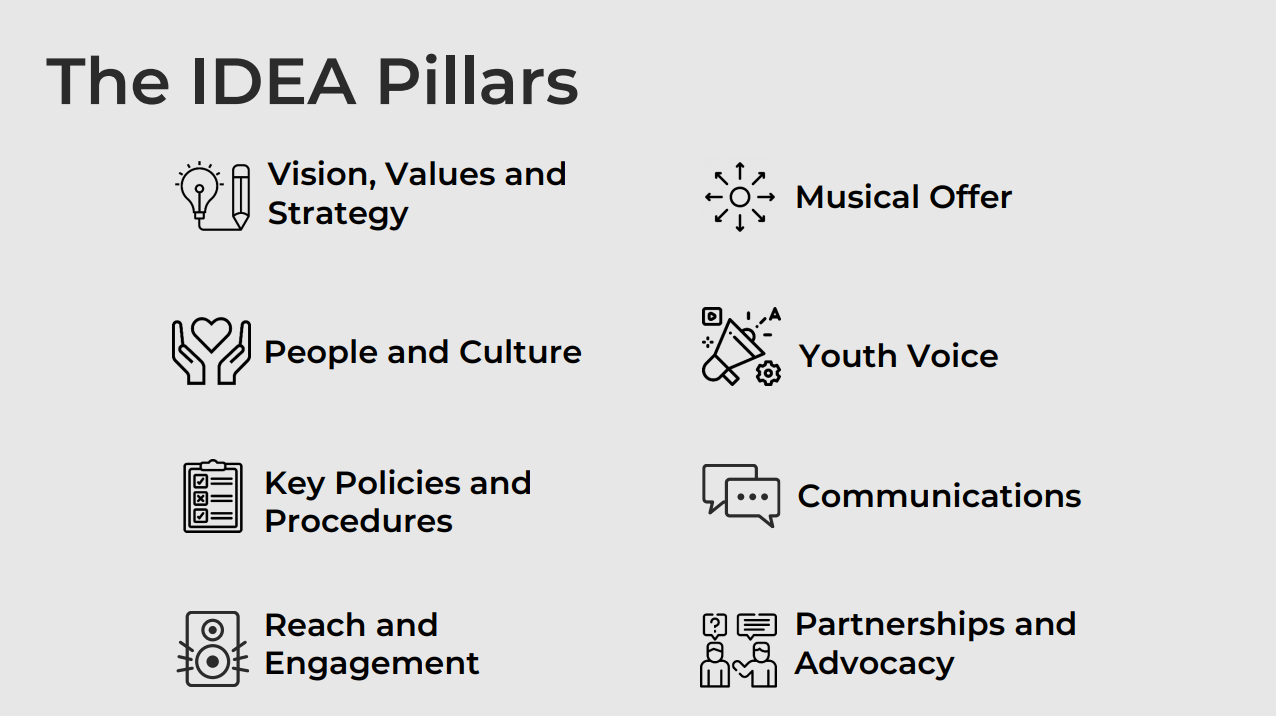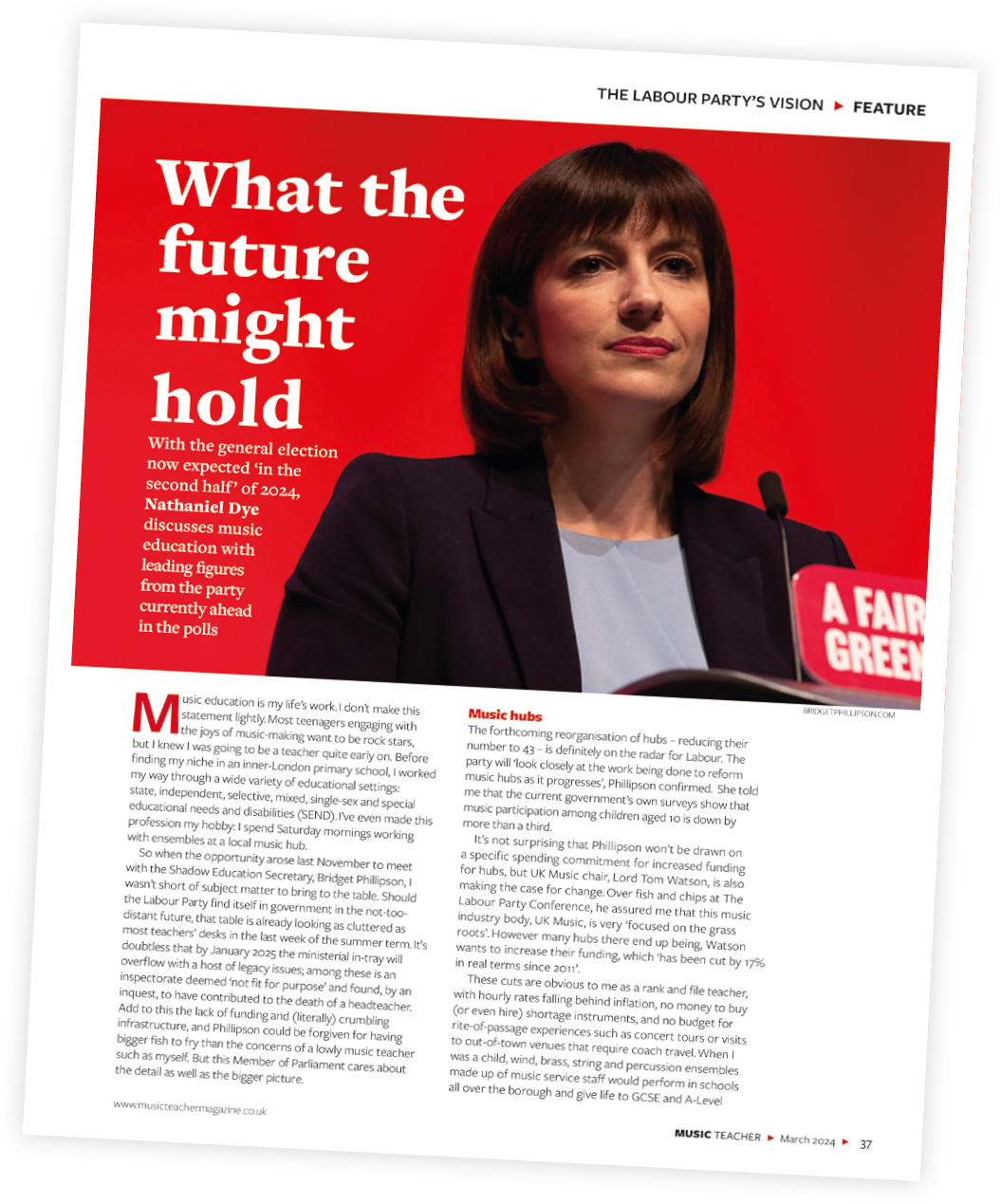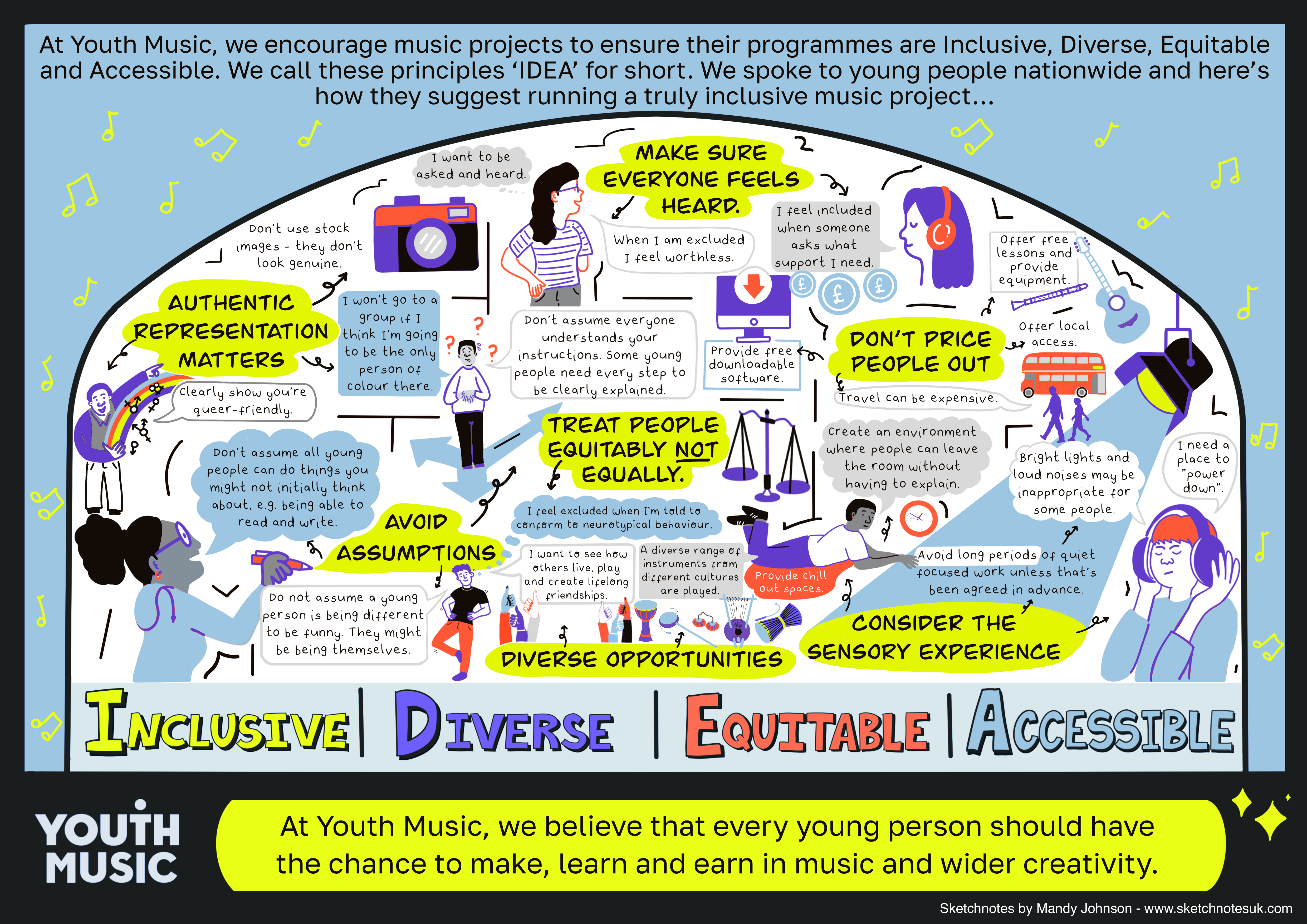
When your schedule involves a jam-packed timetable of lessons, meetings, reviews, interventions, data analysis and more, how does EDI fit in? It's worth mentioning here that EDI is an enormous and multifaceted ideology, and you cannot embrace all aspects of this on your own. So, in this article, we will explore ways in which we can come together and drive meaningful change within what is manageable.
Whether you're reading this as a seasoned advocate or someone just beginning to find their voice, you have a real opportunity to amplify a collective voice and create a future where EDI is not just a dream but a reality for all. We can build a more inclusive world – one where every young person can contribute, thrive and belong in the world of music.
In recent news, 40+ new Hub Lead Organisations (HLOs) have been named. Leicestershire Music hub is one of these. With funding from Arts Council England, we support, deliver and enable access to music education for young people within the local area of Leicester and Leicestershire. The delivery is facilitated through partnerships co-ordinated by hubs, and partners include schools, local authorities, community groups, music organisations and representatives of the music industry. There is an HLO for every area of England, charged with giving all children and young people access to high-quality music education.
IDEA framework
At Leicestershire Music, we refer to ‘IDEA’ – Inclusion, Diversity, Equity and Access – instead of EDI, in line with our work with the Youth Music IDEA project. This project has a framework that reinforces IDEA as more than a set of resources. It's not a playlist, it's not something that you can learn by attending a conference or by reading an article; rather, it's a conscious effort to widen your lens in every aspect of what you do on a day-to-day basis.
The framework and eight pillars of IDEA are shown below. This is designed to guide and support you, and comes with additional case studies and clear action points (available from the Youth Music website) to help you develop your work. When we focus on youth voice and IDEA, the goal is for young people to influence your practice at every level, from co-creating their learning journey to informing programming and strategy. The infograph below illustrates the importance of youth voice, and guides you on how to ensure your offer is truly inclusive (to view an enlarged version, click here).
When we focus on youth voice and IDEA, the goal is for young people to influence your practice at every level, from co-creating their learning journey to informing programming and strategy. The infograph below illustrates the importance of youth voice, and guides you on how to ensure your offer is truly inclusive (to view an enlarged version, click here).
 Sketchnotes by Mandy Johnson/Courtesy of Youth Music
Sketchnotes by Mandy Johnson/Courtesy of Youth Music
Strategy
The National Plan for Music Education has the clear ambition to level up musical opportunities for all children. On closer analysis of the Plan, we find that the word ‘inclusion’ appears 20 times but ‘diversity’ only 5 times (with only 1 reference to ‘cultural diversity’) and ‘equity’ not at all. It is clear that the NPME does not do enough to overhaul the way the sector views IDEA, and that urgent systemic change is needed to ensure that there is a unified understanding and sector-wide commitment to IDEA.
We have all heard the phrase ‘we are on a journey’, but what exactly does this mean? When do you get to your destination? Where is the accountability? If you approach IDEA as a tick-box exercise, with a vague idea of being on a journey, this will lead to having limited impact. So, instead, let's put this talk into action.
Each HLO is required to have an Inclusion Strategy, to ensure its work impacts more pupils and engages with stakeholders supporting this work across their hub area. Each HLO will also have an Inclusion Lead, who supports inclusion, diversity, equity and access across each hub area. This person will be able to listen, advise and provide support for your IDEA work in your own education setting.
Changing the narrative
In recent months, one aspect of IDEA has generated more compassion fatigue than ever before. We know that discussions about race in music education need to continue to drive a culture shift within the sector. Issues won't be dropped from agendas until these are fully addressed.
Terminology is a good place to start, as this can be a sticking point. The word ‘anti-racist’, for example, can incite fear and defensiveness, be misinterpreted, or make some people feel that they are being accused of being racist. The teaching of music through a white colonial lens has been the norm. So, to change this narrative there must be a discussion about decolonising music at department level and in the classroom, in order to make a difference to your pupils and to foster a sense of belonging.
It's a good time to take a fresh look at your classroom and instrumental music curriculums and ask: Do these reflect global influences, and are the schemes of work peer-reviewed for equalities content? Once you begin to spotlight music that includes the positive contributions of people of the Global Majority, you will begin to open up the world of music to all pupils.
You can easily change the narrative when teaching Blues music, for example. You should be clear that there were no ‘African slaves’; rather, these were free people first and foremost, people who were enslaved. At department level, anti-racist practice can be built upon by taking the opportunities to talk and think about the hidden ways that the inequalities of ‘race’ and ethnicity play out in the classroom. It's crucial to address the issue of underrepresentation in music and decide if you can improve your curriculum to intervene proactively in how racism is produced.
It is vital that we have genuine representation and a view of music history that includes appropriate lessons on the context viewed through a non-colonial lens. Numerous black and brown composers changed the course of classical music history and should be celebrated for their work. When we listen to Mozart's music, there needs to be a place for his contemporary Joseph Bologne, Chevalier de Saint-Georges. The lack of inclusion of black female classical composers such as Florence Price should also form part of this wider lens. When we talk about accomplished singers, there should be a place for Lata Mangeshkar, the ‘Nightingale of India’, who sang over 30,000 songs in her lifetime and recorded in over 36 languages, including Russian, Dutch, Nepali and Swahili. She should be celebrated as one of the greatest and most influential singers of the Indian subcontinent, not ignored when we explore vocal traditions.
Local collaboration
We understand the challenge of covering all aspects of EDI, so recently Leicestershire Music worked in partnership with a local organisation called Pedestrian (a leading organisation specialising in music and arts education for young people at risk, in Leicester and across the Midlands).
The collaboration offered a more musically-diverse opportunity for our young people, through performing Max Wheeler's Grime Opera, a groundbreaking piece that celebrated Leicester's vibrant music scene. The opera merged rap, beats and electronic basslines with orchestral music played by the Leicestershire Music Ensemble. This unique fusion not only spotlighted the talents of local artists and musicians, it redefined the musical landscape of diversity and inclusion in music education.
Leicestershire Music is proud to be part of Leicestershire County Council, a Council that is committed to becoming an anti-racist organisation. There is a Senior Policy Officer for Anti-Racism that co-ordinates work throughout the local area and communities. The Leadership in Colour programme works with the global majority employees, empowering people to develop their leadership skills, and there is a commitment to the Race at Work Charter, which ensures that IDEA is the golden thread that runs throughout all the work we do.
Call to action
Take a look at music education conferences, webinars, CPD and networking opportunities available to you as a music educator. Are there speakers from underrepresented groups? If not, where are these? Do speakers focus on intersectionality? IDEA should go beyond tokenistic keynote speakers and marketing materials.
The Music Education Council (MEC), a membership organisation for institutions and individuals with an interest and expertise in music education in its widest and most inclusive sense, is running a series of seminars on race, disability and intersectionality. The series will lead to a National Action Plan for IDEA, with a conference later this year focussing on the work that is being done in these areas. The resilience, creativity and strength of underrepresented groups will be celebrated and recognised for their contribution to the richness and diversity of music education. MEC aims to nurture an environment where educators can support everyone to connect, grow and thrive through music.
In a recent panel discussion I chaired at the Music & Drama Education Expo, the focus on the need for systemic change and a sector-wide commitment to EDI led to the following calls to action:
- Speak to another teacher/your music hub / a school leader about EDI.
- Make a meaningful and brave space for young people, for discussions about EDI.
- Take a risk – listen to your young people.
- Make ONE commitment to yourself and hold yourself accountable.
- Follow underrepresented voices on your social media; engage with them, champion them, and challenge those who go against this.
- Learn about the Youth Music IDEA framework.
- Check out the seminars and work of the MEC.
Now is the right time to spark dialogue, challenge stereotypes, dismantle barriers, and create opportunities for underrepresented pupils to participate and thrive in every aspect of their music education. We must not be worried about making mistakes, but instead harness the power of collective action and seek out and amplify the voices of underrepresented groups to dismantle the barriers to progress as a sector. Moving forward, we can ensure that music education fosters a culture of belonging where everyone feels valued and respected.
What can you do to commit to the call to action and make tangible progress towards the goal of changing the narrative?




